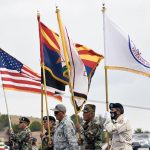
Letters: Disgusted at trash at water source
I am disgusted with the trash that continuously accumulates at our precious water source: Tsaile/Wheatfields (Tsezhin Bitoh Spring).
This spring is our domestic, drinking and livestock water. The trash is filthy and hazardous for our health and safety for our families, livestock, water, Mother Earth, and wildlife.
As individuals and families, we have religious/spiritual values. Where are our teachings to litter the precious spring? Where is Hozhoni, Water is Life, and it’s God recreation?
Come on, wake up to your values and teaching!
Revitalize and reclaim our sacred foundation of beautiful Navajo Nation.
As grandparents/parents, provide strict and structured discipline. With prayer, this will create a safe/healthy future for our sacred Navajo Nation.
Leaders, wake up and stand up for healthy and safe environment.
Charlotte Jane Begaye
(former Many Farms Chapter vice president and Navajo Women and Government Development commissioner)
Many Farms, Ariz.
The meaning of sovereignty
Sovereignty. What does the word mean to you? Based upon my background, sovereignty means the ability to govern ones-self.
On April 16, 1985, the U.S. Supreme Court issued its ruling in Kerr McGee v. Shirley Indian tax case. Kerr-McGee was a non-Navajo entity operating on the Navajo Nation, in the business of natural resource development.
Kerr-McGee did not believe that the Navajo Nation had the right to enact a tribal tax code that would assess a tax on their activity within the boundaries of the Navajo Nation.
The court case eventually was heard before the U.S. Supreme Court. In its decision, the court recognized Indian nations (all Indian nations, not just Navajo) as sovereign governments. As such, Indian nations had the right and ability to enact their own laws, statutes, ordinances and/or codes for activity occurring within the boundaries of their respective reservations.
Indian nations have always been sovereign nations, but it took an Indian tax law case for the U.S. judicial system to announce that status and what it then meant for business activity occurring within the respective reservations.
Not long after, the Navajo Nation Council set this day aside as a holiday to commemorate this important recognition.
Over the years, the Council has moved Navajo Sovereignty Day around the month of April due to scheduling conflicts with its spring session. However, most recently in 2017, the 23rd Council moved Navajo Sovereignty Day back to April 16th and changed the status from a paid holiday to a day of observance.
Five years later, I’m still not sure what a day of observance is. And I still scratch my head at why this holiday, of the 12 other Navajo Nation holidays, was changed to only a day of observance.
The one day in which we, the Navajo Nation, won a court case decided at the U.S. Supreme Court level. The one day in which Navajo recognized its sovereignty and, like Navajo Code Talker Day, both are truly Navajo holidays.
Over these last five years, I’m also continually amazed at how only the Navajo Nation recognizes this change in day and time off. Many of the enterprises and school districts still recognize April 20th, or the fourth Monday of April, as a paid holiday. Even the Navajo Nation Judicial Branch recognizes April 16th as a paid holiday (however, their personnel policy manual, dated 2013 states the fourth Monday in April).
Of all of these entities, I applaud the nation Judicial Branch for continuing to recognize April 16th as a holiday celebrating Navajo Sovereignty Day.
So, I hope on Friday, April 15, and Saturday, April 16, we buy from a store located on the Navajo Nation. With our purchasing power, we not only help to celebrate sovereignty but we also help to circulate money earned on Navajo. We help to build our Navajo economy.
Then, the tax revenue generated from your purchase stays here with the Navajo Nation. The revenue is used to help fund Navajo Nation programs and services.
The only way the Navajo Nation can improve its economy is with the Navajo people buying from stores on the Navajo Nation. Without solid purchasing power to date, the Navajo Nation will continue to be hard pressed to attract franchisees to operate on the Navajo Nation.
So if we want more restaurants, grocery stores, or other businesses, we need to start by using our money here, on the Navajo Nation.
Happy Sovereignty Day…
Mark C. Graham
Navajo Tax Commissioner
Gilbert, Ariz.
Strongly disagree with Tonalea grand-opening story
Ms. Krista Allen, Assistant Editor,
I am strongly in disagreement to an article you submitted on behalf of the Tonalea Chapter grand-opening article. I would like for you to retract the story and get it right.
You never attempted to interview me as I was the chapter president and during our tenure we secured the funding (2017-20) and I find it that you grossly neglected to give proper credit, the president’s office and the Council is not mentioned as well.
Please recant your article and publish factual information based on what the leadership and I worked on behalf of the community to accomplish.
When I was elected in 2017, the leadership was presented with a 40% incomplete funding packet under Colbert Dayzie’s leadership as we were tasked to secure funds for a new chapter.
In a regular chapter meeting, Ms. Marlinda Whiterock, chapter manager, explained to the community that she could not complete the funding proposal and she requested Council Delegate Tuchoney Slim Jr. to complete the proposal himself.
Contrary to the delegate’s responsibilities, the delegate handed off the incomplete proposal to DCD and they assigned two staff members to complete the proposal. The actual rendering of the chapter (square footage that Colbert Dayzie was trying to push for) he made sure he locked into a contract as he left his seat in 2017.
The Tonalea Chapter’s annual allocation was not enough to maintain the operations and maintenance of a building that was over 8,000 square feet — the officials that I served with had to make pleas with the architectural engineers to bring the square footage of the building down to 5,000 square feet. This was accomplished after many meetings of negotiations and $85,000 change order that the chapter had to pay for the previous leadership negligence.
The leadership I served with had to make many meetings to secure the funds for the new chapter building and lobbying efforts.
Colbert Dayzie never supported me nor the chapter leadership. He was employed by NTUA in Window Rock at the time and all he did was work against the chapter’s initiatives, including the officials, and he would make his rounds in Window Rock passing bad information to the departments. Politically, you just published a story based on those that never did the work.
I compel that you get the story correct as many community members are appalled over this article you published.
Sarah Slim
Tonalea (Red Lake), Ariz.
Nation should intercede in death-row case
Per newspaper report, Clarence Dixon, a Navajo, is to be executed in Arizona State Prison for the murder of a college girl in 1977. The paper also reported that Dixon is mentally ill.
The United States of America was founded on Christian principles and more civilized than most nations is still behaving like uncivilized nations of days B.C. – unbelievable.
Majority of Americans go to church every week to say their prayers and pray for others.
I see two problems in Clarence Dixon’s case. One, the man is mentally ill. Secondly, Christian beliefs per the gospel of John: When a lady was accused of wrongdoing and the Romans wanted her to be stoned to death pursuant to their law, Jesus said, “Let the one without sin cast the first stone.” No one picked up a stone and the woman went free.
Navajo belief is very similar. There is no such thing as “an eye for an eye” in Navajo tradition. Therefore, Navajo does not believe in killing another human being, especially if they are sick.
Navajo Nation should intercede. Yes, it’s tragic, very sad and incomprehensible to lose a family member through murder or even through a car accident. Our condolences and prayers to the family.
Peter MacDonald Sr.
Former Chairman of the Navajo Tribal Council
Tuba City, Ariz.
Council misdeeds: the enemy within
As the most powerful tribe in the nation, it is always defending itself against outsiders that attempt to diminish its sovereign status and interfere with our self-determination plight. However, our demise may come from within the tribe.
To the point, once again the Council has proven their willingness to play “petty politics” at the expense of the entire nation. Namely, it is attempting to pull its “discretionary card” in an attempt in win votes for their re-election. As such, they have failed to understand that seemingly “petty politics” to get re-elected has far-reaching consequences.
The newspaper has been reporting the last time they pulled the “discretionary card” it required the other two branches and the people making new laws to put an end to the calamity. Seemingly, they spent more than $30 million before they were stopped.
But the newspaper did not report the rest of the story.
First, after the Council lost their battle in the Supreme Court and with the people, they seriously considered ignoring the Supreme Court orders. Apparently, they were advised by their legal counsel.
Thus, the U.S., again, considered declaring Marshall law in order to prevent another 1989 fiasco, reasoning that the tribe cannot govern itself due to tribal corruption. But that did not happen.
Second, afterwards the tribe instituted reforms and bans. For example, their legal counsel was disbarred by the Supreme Court, ordered to pay back over $100,000, etc. Basically, he was exiled. I think they used the “bad man” clause in the treaty.
This problem began in 1990 when the Council allocated monies to reform itself. However, after spending more than $30 million, initially and more later, including setting up a fully-staffed reform department, they did not pass one reform law.
Accordingly, for 32 years the tribal government is stuck in the mud and not developing a “constitutional” form of government. The nation still does not have a constitution after all that money was spent. They are not accountable.
Plainly, the Council does not want reforms to achieve a more balanced government with its “checks and balances” and “separation of powers.” It’s a “political” power play.
For example, they do not want their questionable actions to be cited as “unconstitutional.” There is no constitution, therefore, their actions cannot be called “unconstitutional.”
On the other hand, the other big tribe, the great Cherokee Nation, developed and established their own Western-style “constitutional” form of government in the 1830s.
Yet, the Dineh did not have one. However, the people do have the Dineh Fundamental Law to fight the corruption within.
If the Council pulls the “discretionary card” again, they proved they cannot learn from their past mistakes and they will do it again — at the expense to the nation.
The Council has failed to represent us again. In this regard, I praise the eight delegates that did the right thing. They are patriots.
I do not want federal Marshall law forced upon me. I want Dineh law. The Dineh Fundamental Law seemingly rejects “petty political” to gain votes. It is corruptive in nature and is reviewed as a person selling himself or herself.
I trust and believe in my government to do the right — except for the Council and their lawyer(s).
Raymond Yazzie
Window Rock, Ariz.

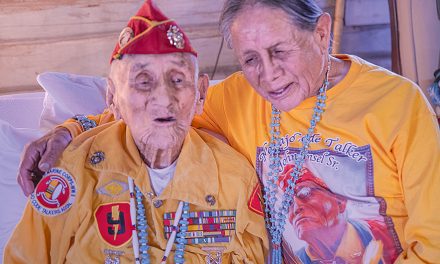
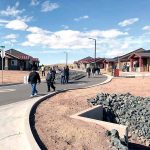
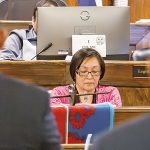

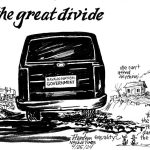


 Highway 264,
Highway 264, I-40, WB @ Winslow
I-40, WB @ Winslow